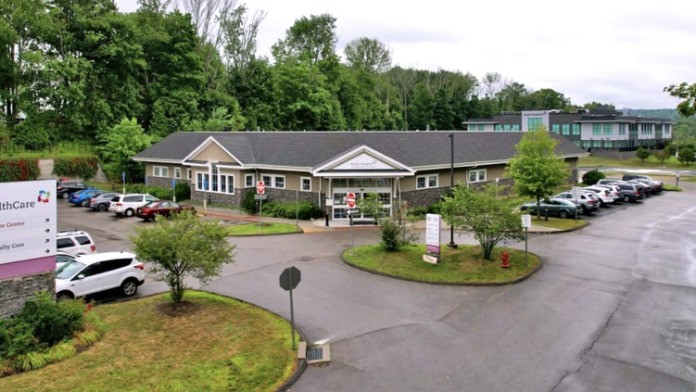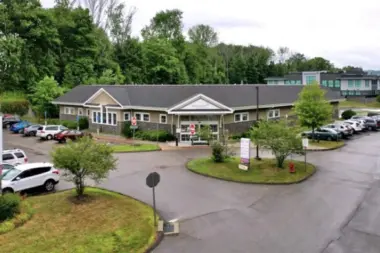Don’t actually know how their treatment is, because 3 months after my referral to them by my primary care doctor, they still haven’t contacted me to set up an appointment. I’ve called them twice and been told each time that they had my referral and a scheduler would ca ...
About Backus Center for Mental Health
Backus Center for Mental Health is in the small town of Norwich, Connecticut, midway between Providence and Hartford, and just a few miles from Block Island Sound. The hospital’s Department of Psychiatric Services provides mental health services for adults who are experiencing a wide range of disorders and difficulties including severe and prolonged mental illness. They work with most major health insurance providers in the state and will help verify your insurance coverage to reduce out-of-pocket expenses.
Locked Inpatient Care for Dual Diagnosis
You may take advantage of an inpatient program that provides quality services to individuals with a psychiatric disorder such as major depression, schizophrenia or anxiety. They also treat dual diagnoses of substance use disorders and mental health conditions. Dual diagnosis treatment requires integrated care because the diagnoses often exacerbate each other.
The inpatient program is a locked and secured unit in which you can request voluntary admission or may be involuntarily committed. They use a multidisciplinary team approach and provide round-the-clock psychiatric nurses and mental health workers.
Outpatient Partial Hospitalization Program
Your evaluation may indicate that you would benefit from their partial hospitalization program (PHP) to address your dual diagnosis. In the PHP you’ll receive highly structured and intense treatment for up to five hours each day for five days per week. This helps you avoid inpatient treatment and allows you to interact with and receive support from your friends and family. Other outpatient service components include individual and group assessments and therapy sessions as well as medication evaluation and treatment.
Facility Overview
Latest Reviews
Rehab Score
Gallery


Accepted Insurance
Other Forms of Payment
Medicaid is a state based program that helps lower-income individuals and families pay for healthcare. Medicaid covers addiction treatment so those enrolled can use their coverage to pay for rehab. When a program accepts Medicaid the client often pays very little or nothing out of their own pocket.
Private insurance refers to any kind of healthcare coverage that isn't from the state or federal government. This includes individual and family plans offered by an employer or purchased from the Insurance Marketplace. Every plan will have different requirements and out of pocket costs so be sure to get the full details before you start treatment.
Self-pay involves paying for treatment out of your own pocket. You can use savings or credit, get a personal loan, or receive help from family and friends to fund your treatment. If you don't have insurance or your insurance plan doesn't cover a specific program, self-pay can help ensure you still get the care you need.
Financial aid can take many forms. Centers may have grants or scholarships available to clients who meet eligibility requirements. Programs that receive SAMHSA grants may have financial aid available for those who need treatment as well. Grants and scholarships can help you pai for treatment without having to repay.
Sliding scale payments are based on a client's income and family size. The goal is to make treatment affordable to everyone. By taking these factors into account, addiction recovery care providers help ensure that your treatment does not become a financial burden to you or your family, eliminating one barrier to care.
Medicare is a federal program that provides health insurance for those 65 and older. It also serves people under 65 with chronic and disabling health challenges. To use Medicare for addiction treatment you need to find a program that accepts Medicare and is in network with your plan. Out of pocket costs and preauthorization requirements vary, so always check with your provider.
Military members, veterans, and eligible dependents have access to specific insurance programs that help them get the care they need. TRICARE and VA insurance can help you access low cost or no cost addiction and mental health treatment. Programs that accept military insurance often have targeted treatment focused on the unique challenges military members, veterans, and their families face.
Addiction Treatments
Levels of Care
Partial hospitalization, which is offered for five hours a day, for up to five days per week, can follow a course of inpatient treatment, or to avoid inpatient treatment altogether. This level of care allows patients to continue to interact and receive the support of their families, friends and other support systems, as well as maintain many of their personal activities.
Drug and alcohol addiction often takes a heavy toll on one's body. Over time, a physical dependence can develop, meaning the body physiologically needs the substance to function. Detox is the process of removing drugs and/or alcohol from the body, a process that can be lethal if mismanaged. Medical detox is done by licensed medical professionals who monitor vital signs and keep you safe, healthy, and as comfortable as possible as you go through detox and withdrawal.
Intensive Outpatient Programs (IOP) are for those who want or need a very structured treatment program but who also wish to live at home and continue with certain responsibilities (such as work or school). IOP substance abuse treatment programs vary in duration and intensity, and certain outpatient rehab centers will offer individualized treatment programs.
The unit is locked and secure allowing the admission of individuals on a voluntary basis, as well as those requiring commitment for treatment. The unit is organized in a multi-disciplinary fashion with psychiatrists, psychologists, social workers, occupational therapists, and an around the clock complement of psychiatric nurses and mental health workers. Patients are admitted around the clock. The mental health team works effectively to restore patients to the highest level of functioning, as quickly as possible, so that they can continue to receive treatment in the least restrictive environment possible.
A partial hospitalization program (PHP) offers short-term intensive rehab for those who don't require 24-hour care. PHP treatment can serve as an alternative to inpatient hospitalization or a step-down option after being released from a hospital or residential program. A partial hospitalization program can provide medication management, relapse prevention strategies, and behavioral therapy interventions. With daily sessions lasting up to 8 hours for up to 5 days a week, the duration can vary with the average being 90 days.
Treatments
The goal of treatment for alcoholism is abstinence. Those with poor social support, poor motivation, or psychiatric disorders tend to relapse within a few years of treatment. For these people, success is measured by longer periods of abstinence, reduced use of alcohol, better health, and improved social functioning. Recovery and Maintenance are usually based on 12 step programs and AA meetings.
Drug rehab in Connecticut provides the professional support that is often necessary to break free from drug dependency. With proper treatment, individuals can make changes that restore balance and health to their lives and achieve long-term recovery.
Many of those suffering from addiction also suffer from mental or emotional illnesses like schizophrenia, bipolar disorder, depression, or anxiety disorders. Rehab and other substance abuse facilities treating those with a dual diagnosis or co-occurring disorder administer psychiatric treatment to address the person's mental health issue in addition to drug and alcohol rehabilitation.
A combined mental health and substance abuse rehab has the staff and resources available to handle individuals with both mental health and substance abuse issues. It can be challenging to determine where a specific symptom stems from (a mental health issue or an issue related to substance abuse), so mental health and substance abuse professionals are helpful in detangling symptoms and keeping treatment on track.
Opioid rehabs specialize in supporting those recovering from opioid addiction. They treat those suffering from addiction to illegal opioids like heroin, as well as prescription drugs like oxycodone. These centers typically combine both physical as well as mental and emotional support to help stop addiction. Physical support often includes medical detox and subsequent medical support (including medication), and mental support includes in-depth therapy to address the underlying causes of addiction.
In Connecticut you'll find a range of substance abuse rehabs providing effective and individualized care, which dramatically increases long-term recovery outcomes. These programs include various levels of care, including inpatient, medically assisted detox, and partial hospitalization programs. You'll receive a comprehensive assessment and individualized treatment plan, to determine the appropriate level of care and evidence-based interventions. You can expect individual and group therapy, skills classes, and relapse prevention training.
Inpatient and outpatient addiction treatment addresses both the physical and mental aspects of chemical dependency. Naturally, mental health services are provided during that treatment process and may include individual and group counseling and relapse prevention education.
Programs
Adult rehab programs include therapies tailored to each client's specific needs, goals, and recovery progress. They are tailored to the specific challenges adult clients may face, including family and work pressures and commitments. From inpatient and residential treatment to various levels of outpatient services, there are many options available. Some facilities also help adults work through co-occurring conditions, like anxiety, that can accompany addiction.
Young adulthood can be an exciting, yet difficult, time of transition. Individuals in their late teens to mid-20s face unique stressors related to school, jobs, families, and social circles, which can lead to a rise in substance use. Rehab centers with dedicated young adult programs will include activities and amenities that cater to this age group, with an emphasis on specialized counseling, peer socialization, and ongoing aftercare.
Clinical Services
Group therapy is any therapeutic work that happens in a group (not one-on-one). There are a number of different group therapy modalities, including support groups, experiential therapy, psycho-education, and more. Group therapy involves treatment as well as processing interaction between group members.
In individual therapy, a patient meets one-on-one with a trained psychologist or counselor. Therapy is a pivotal part of effective substance abuse treatment, as it often covers root causes of addiction, including challenges faced by the patient in their social, family, and work/school life.
Trauma therapy addresses traumatic incidents from a client's past that are likely affecting their present-day experience. Trauma is often one of the primary triggers and potential causes of addiction, and can stem from child sexual abuse, domestic violence, having a parent with a mental illness, losing one or both parents at a young age, teenage or adult sexual assault, or any number of other factors. The purpose of trauma therapy is to allow a patient to process trauma and move through and past it, with the help of trained and compassionate mental health professionals.
According to cognitive behavioral therapy in Connecticut, individuals can change their behaviors by changing their thoughts. Applied to substance use disorder, this can be an effective treatment method to help patients transform their thoughts and lives.
Clients participating in dialectical behavior therapy in Connecticut can expect to attend weekly skills focused group meetings as well as one on one sessions with the therapist. Individual sessions usually last one hour, and groups, made up of four to 10 people, last 1.5 to 2 hours. The focus is to help clients accept situations, recognize emotions, and acknowledge the need for change.
Amenities
-
Private Setting
Staff
Donna Handley
Senior VP, Hartford HealthCare & East Region President
Anthony Mastroianni
VP, Financial Services
Matthew Kaufman
VP
Liz Li, Human Resources
VP
Contact Information
326 Washington street
Norwich, CT 06360



